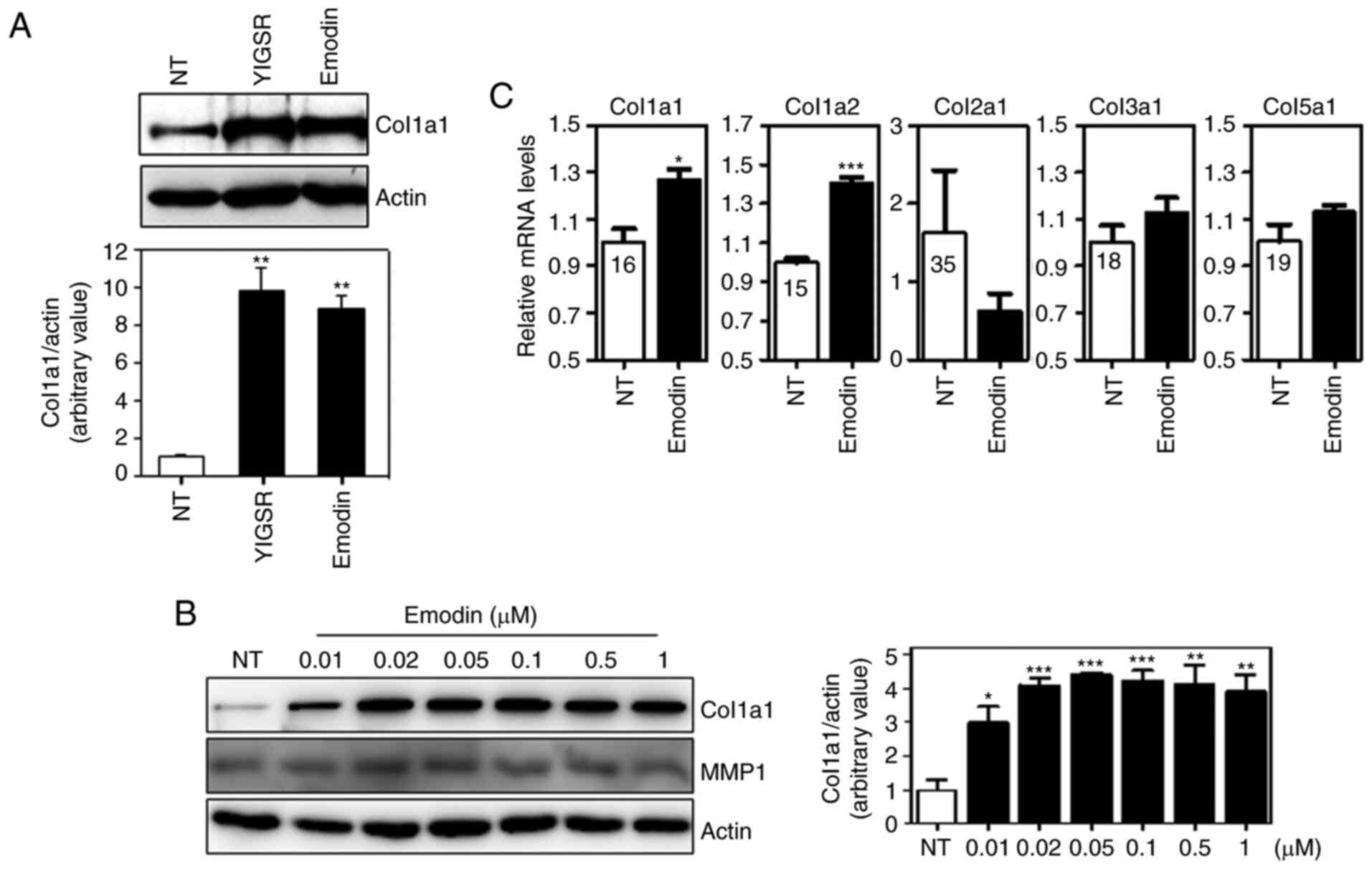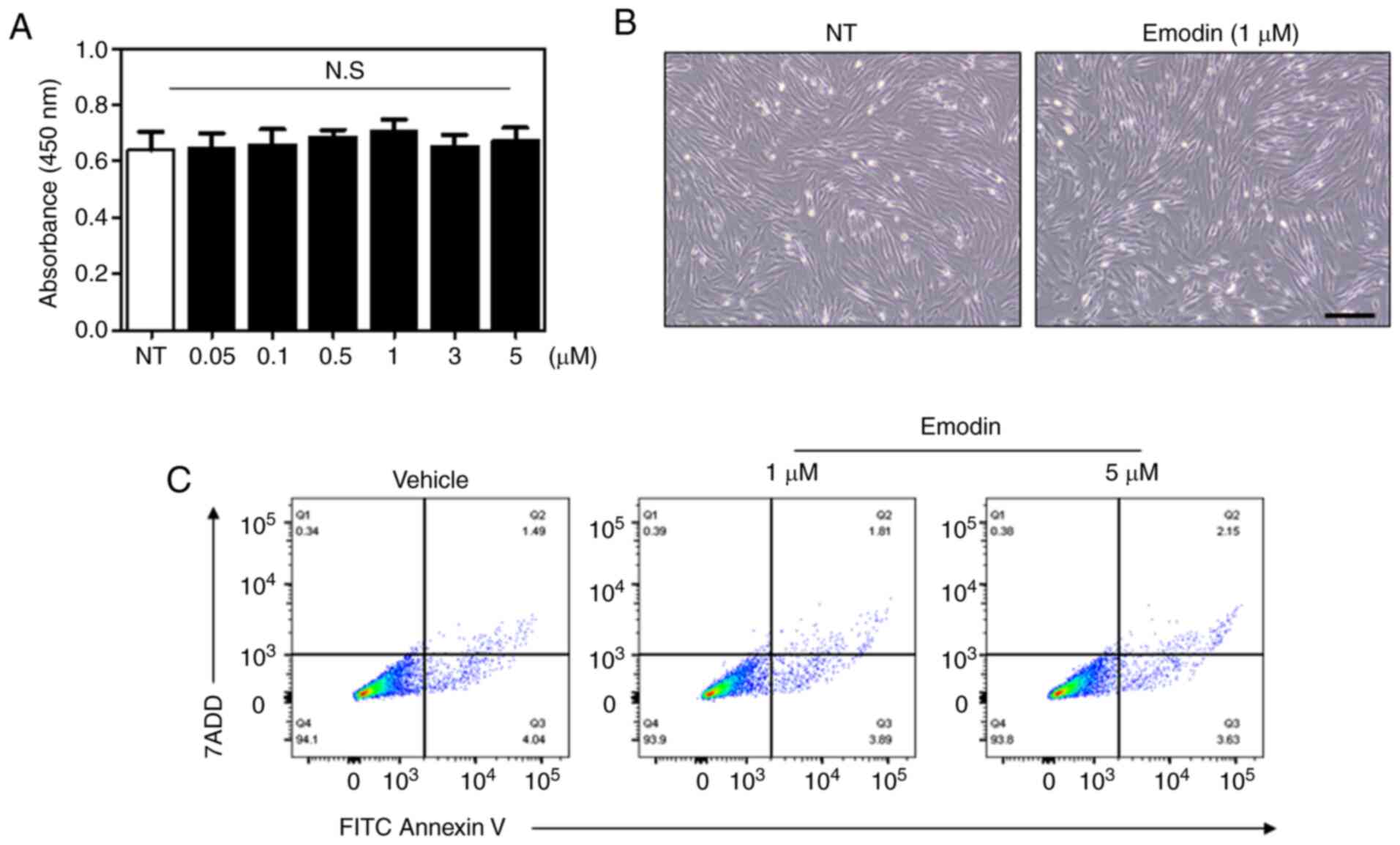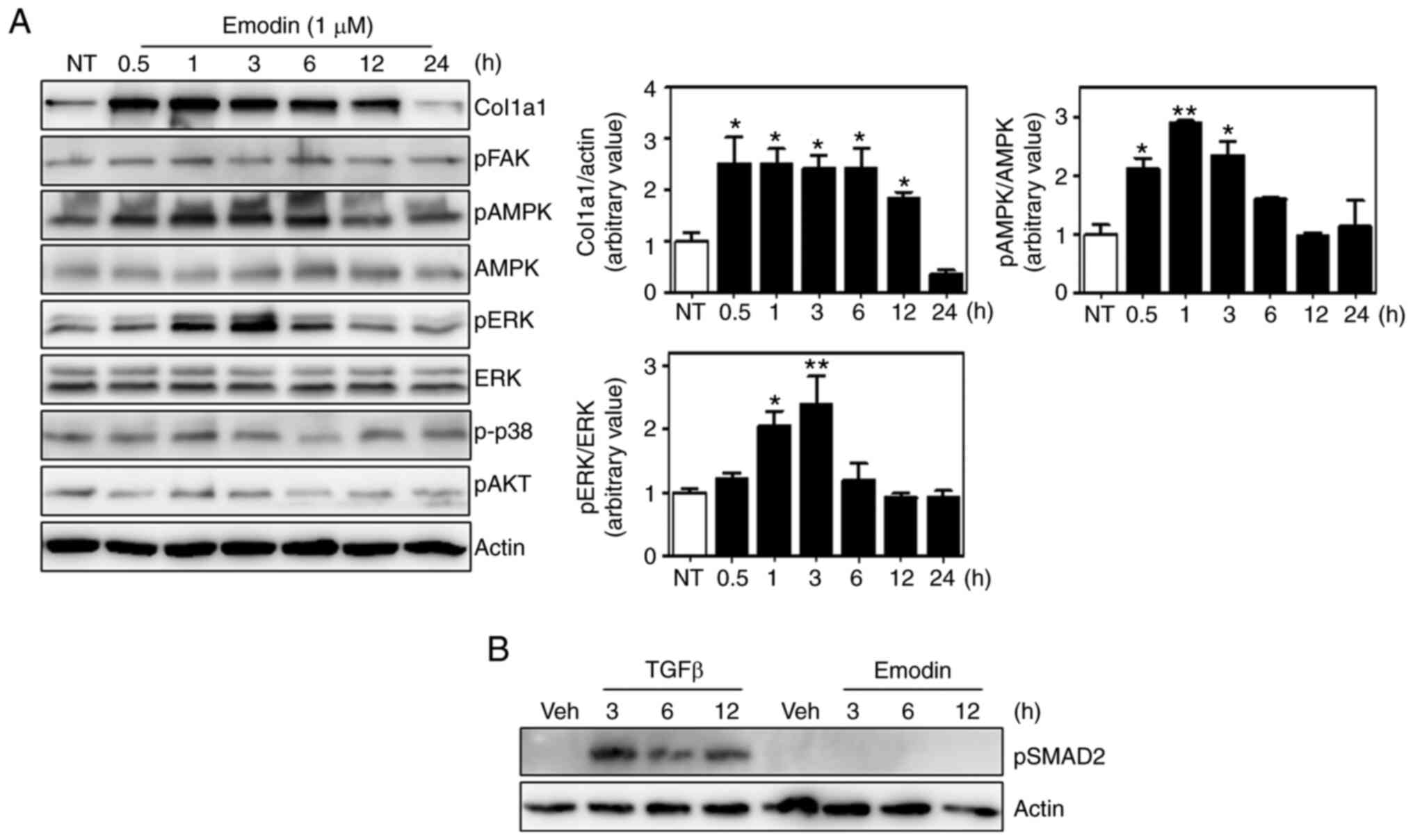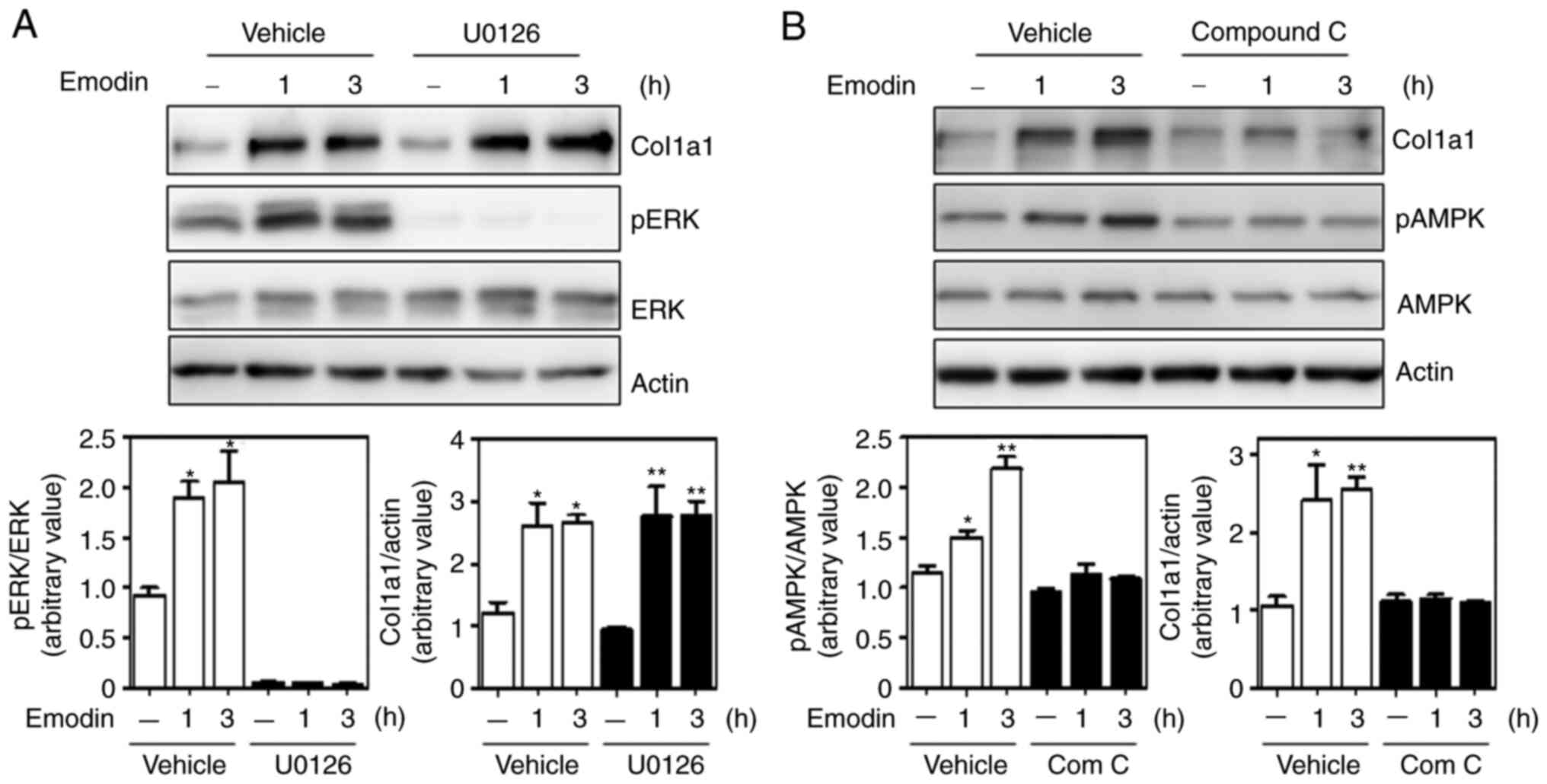|
1
|
Zhao X, Psarianos P, Ghoraie LS, Yip K,
Goldstein D, Gilbert R, Witterick I, Pang H, Hussain A, Lee JH, et
al: Metabolic regulation of dermal fibroblasts contributes to skin
extracellular matrix homeostasis and fibrosis. Nat Metab.
1:147–157. 2019.PubMed/NCBI View Article : Google Scholar
|
|
2
|
Avila Rodriguez MI, Rodriguez Barroso LG
and Sánchez ML: Collagen: A review on its sources and potential
cosmetic applications. J Cosmet Dermatol. 17:20–26. 2018.PubMed/NCBI View Article : Google Scholar
|
|
3
|
de Araújo R, Lôbo M, Trindade K, Silva DF
and Pereira N: Fibroblast growth factors: A controlling mechanism
of skin aging. Skin Pharmacol Physiol. 32:275–282. 2019.PubMed/NCBI View Article : Google Scholar
|
|
4
|
Mäkitie RE, Costantini A, Kämpe A, Alm JJ
and Mäkitie O: New insights into monogenic causes of osteoporosis.
Front Endocrinol (Lausanne). 10(70)2019.PubMed/NCBI View Article : Google Scholar
|
|
5
|
Irawan V, Sung TC, Higuchi A and Ikoma T:
Collagen scaffolds in cartilage tissue engineering and relevant
approaches for future development. Tissue Eng Regen Med.
15:673–697. 2018.PubMed/NCBI View Article : Google Scholar
|
|
6
|
Armendariz-Borunda J, Katayama K and Seyer
JM: Transcriptional mechanisms of type I collagen gene expression
are differentially regulated by interleukin-1 beta, tumor necrosis
factor alpha, and transforming growth factor beta in Ito cells. J
Biol Chem. 267:14316–14321. 1992.PubMed/NCBI
|
|
7
|
Gillery P, Leperre A, Maquart FX and Borel
JP: Insulin-like growth factor-I (IGF-I) stimulates protein
synthesis and collagen gene expression in monolayer and lattice
cultures of fibroblasts. J Cell Physiol. 152:389–396.
1992.PubMed/NCBI View Article : Google Scholar
|
|
8
|
Honda N, Jinnin M, Kajihara I, Makino T,
Makino K, Masuguchi S, Fukushima S, Okamoto Y, Hasegawa M, Fujimoto
M and Ihn H: TGF-β-mediated downregulation of microRNA-196a
contributes to the constitutive upregulated type I collagen
expression in scleroderma dermal fibroblasts. J Immunol.
188:3323–3331. 2012.PubMed/NCBI View Article : Google Scholar
|
|
9
|
Mishra R, Zhu L, Eckert RL and Simonson
MS: TGF-beta-regulated collagen type I accumulation: Role of
Src-based signals. Am J Physiol Cell Physiol. 292:C1361–C1369.
2007.PubMed/NCBI View Article : Google Scholar
|
|
10
|
Murad S, Sivarajah A and Pinnell SR:
Prolyl and lysyl hydroxylase activities of human skin fibroblasts:
Effect of donor age and ascorbate. J Invest Dermatol. 75:404–407.
1980.PubMed/NCBI View Article : Google Scholar
|
|
11
|
Tsuji-Naito K, Ishikura S, Akagawa M and
Saeki H: α-Lipoic acid induces collagen biosynthesis involving
prolyl hydroxylase expression via activation of TGF-β-Smad
signaling in human dermal fibroblasts. Connect Tissue Res.
51:378–387. 2010.PubMed/NCBI View Article : Google Scholar
|
|
12
|
Yamauchi M and Sricholpech M: Lysine
post-translational modifications of collagen. Essays Biochem.
52:113–133. 2012.PubMed/NCBI View Article : Google Scholar
|
|
13
|
Tsutsumi Y, Kakumu S, Yoshioka K, Arao M,
Inoue M and Wakita T: Effects of various cytokines on collagen
synthesis by normal rat hepatocytes in primary cultures and
fibroblasts. Digestion. 44:191–199. 1989.PubMed/NCBI View Article : Google Scholar
|
|
14
|
Nakamuta M, Kotoh K, Enjoji M and Nawata
H: Effects of fibril- or fixed-collagen on matrix
metalloproteinase-1 and tissue inhibitor of matrix
metalloproteinase-1 production in the human hepatocyte cell line
HLE. World J Gastroenterol. 11:2264–2268. 2005.PubMed/NCBI View Article : Google Scholar
|
|
15
|
Quan T, Qin Z, Xu Y, He T, Kang S,
Voorhees JJ and Fisher GJ: Ultraviolet irradiation induces
CYR61/CCN1, a mediator of collagen homeostasis, through activation
of transcription factor AP-1 in human skin fibroblasts. J Invest
Dermatol. 130:1697–1706. 2010.PubMed/NCBI View Article : Google Scholar
|
|
16
|
Ganceviciene R, Liakou AI, Theodoridis A,
Makrantonaki E and Zouboulis CC: Skin anti-aging strategies.
Dermatoendocrinol. 4:308–319. 2012.PubMed/NCBI View Article : Google Scholar
|
|
17
|
Galicka A and Nazaruk J: Stimulation of
collagen biosynthesis by flavonoid glycosides in skin fibroblasts
of osteogenesis imperfecta type I and the potential mechanism of
their action. Int J Mol Med. 20:889–895. 2007.PubMed/NCBI
|
|
18
|
Kwok HH, Yue PY, Mak NK and Wong RN:
Ginsenoside Rb(1) induces type I collagen expression through
peroxisome proliferator-activated receptor-delta. Biochem
Pharmacol. 84:532–539. 2012.PubMed/NCBI View Article : Google Scholar
|
|
19
|
Lucarini M, Sciubba F, Capitani D, Di
Cocco ME, D'Evoli L, Durazzo A, Delfini M and Lombardi Boccia G:
Role of catechin on collagen type I stability upon oxidation: A NMR
approach. Nat Prod Res. 34:53–62. 2020.PubMed/NCBI View Article : Google Scholar
|
|
20
|
Dong X, Fu J, Yin X, Cao S, Li X, Lin L
and Huyiligeqi; Ni J: Emodin: A review of its pharmacology,
toxicity and pharmacokinetics. Phytother Res. 30:1207–1218.
2016.PubMed/NCBI View
Article : Google Scholar
|
|
21
|
Wang M, Zhao R, Wang W, Mao X and Yu J:
Lipid regulation effects of Polygoni Multiflori Radix, its
processed products and its major substances on steatosis human
liver cell line L02. J Ethnopharmacol. 139:287–293. 2012.PubMed/NCBI View Article : Google Scholar
|
|
22
|
Wang W, Zhou Q, Liu L and Zou K:
Anti-allergic activity of emodin on IgE-mediated activation in
RBL-2H3 cells. Pharmacol Rep. 64:1216–1222. 2012.PubMed/NCBI View Article : Google Scholar
|
|
23
|
Andersen DO, Weber ND, Wood SG, Hughes BG,
Murray BK and North JA: In vitro virucidal activity of selected
anthraquinones and anthraquinone derivatives. Antiviral Res.
16:185–196. 1991.PubMed/NCBI View Article : Google Scholar
|
|
24
|
Hwang JK, Noh EM, Moon SJ, Kim JM, Kwon
KB, Park BH, You YO, Hwang BM, Kim HJ, Kim BS, et al: Emodin
suppresses inflammatory responses and joint destruction in
collagen-induced arthritic mice. Rheumatology (Oxford).
52:1583–1591. 2013.PubMed/NCBI View Article : Google Scholar
|
|
25
|
Srinivas G, Babykutty S, Sathiadevan PP
and Srinivas P: Molecular mechanism of emodin action: Transition
from laxative ingredient to an antitumor agent. Med Res Rev.
27:591–608. 2007.PubMed/NCBI View Article : Google Scholar
|
|
26
|
Ahn SM, Kim HN, Kim YR, Choi YW, Kim CM,
Shin HK and Choi BT: Emodin from Polygonum multiflorum
ameliorates oxidative toxicity in HT22 cells and deficits in
photothrombotic ischemia. J Ethnopharmacol. 188:13–20.
2016.PubMed/NCBI View Article : Google Scholar
|
|
27
|
Gundogdu G, Gundogdu K, Nalci KA,
Demirkaya AK, Yılmaz Tascı S, Demirkaya Miloglu F, Senol O and
Hacimuftuoglu A: The effect of parietin isolated from rheum ribes L
on in vitro wound model using human dermal fibroblast cells. Int J
Low Extrem Wounds. 18:56–64. 2019.PubMed/NCBI View Article : Google Scholar
|
|
28
|
Tang T, Yin L, Yang J and Shan G: Emodin,
an anthraquinone derivative from Rheum officinale Baill,
enhances cutaneous wound healing in rats. Eur J Pharmacol.
567:177–185. 2007.PubMed/NCBI View Article : Google Scholar
|
|
29
|
Xiao D, Zhang Y, Wang R, Fu Y, Zhou T,
Diao H, Wang Z, Lin Y, Li Z, Wen L, et al: Emodin alleviates
cardiac fibrosis by suppressing activation of cardiac fibroblasts
via upregulating metastasis associated protein 3. Acta Pharm Sin B.
9:724–733. 2019.PubMed/NCBI View Article : Google Scholar
|
|
30
|
Kapoor M, Howard R, Hall I and Appleton I:
Effects of epicatechin gallate on wound healing and scar formation
in a full thickness incisional wound healing model in rats. Am J
Pathol. 165:299–307. 2004.PubMed/NCBI View Article : Google Scholar
|
|
31
|
Lin LX, Wang P, Wang YT, Huang Y, Jiang L
and Wang XM: Aloe vera and Vitis vinifera improve wound healing in
an in vivo rat burn wound model. Mol Med Rep. 13:1070–1076.
2016.PubMed/NCBI View Article : Google Scholar
|
|
32
|
Livak KJ and Schmittgen TD: Analysis of
relative gene expression data using real-time quantitative PCR and
the 2(-Delta Delta C(T)) method. Methods. 25:402–408.
2001.PubMed/NCBI View Article : Google Scholar
|
|
33
|
Yoon JH, Kim J, Lee H, Kim SY, Jang HH,
Ryu SH, Kim BJ and Lee TG: Laminin peptide YIGSR induces collagen
synthesis in Hs27 human dermal fibroblasts. Biochem Biophys Res
Commun. 428:416–421. 2012.PubMed/NCBI View Article : Google Scholar
|
|
34
|
Bhogal RK and Bona CA: Regulatory effect
of extracellular signal-regulated kinases (ERK) on type I collagen
synthesis in human dermal fibroblasts stimulated by IL-4 and IL-13.
Int Rev Immunol. 27:472–496. 2008.PubMed/NCBI View Article : Google Scholar
|
|
35
|
Kimoto K, Nakatsuka K, Matsuo N and
Yoshioka H: p38 MAPK mediates the expression of type I collagen
induced by TGF-beta 2 in human retinal pigment epithelial cells
ARPE-19. Invest Ophthalmol Vis Sci. 45:2431–2437. 2004.PubMed/NCBI View Article : Google Scholar
|
|
36
|
Rajshankar D, Wang Y and McCulloch CA:
Osteogenesis requires FAK-dependent collagen synthesis by
fibroblasts and osteoblasts. FASEB J. 31:937–953. 2017.PubMed/NCBI View Article : Google Scholar
|
|
37
|
Yokoyama K, Kimoto K, Itoh Y, Nakatsuka K,
Matsuo N, Yoshioka H and Kubota T: The PI3K/Akt pathway mediates
the expression of type I collagen induced by TGF-β2 in human
retinal pigment epithelial cells. Graefes Arch Clin Exp Ophthalmol.
250:15–23. 2012.PubMed/NCBI View Article : Google Scholar
|
|
38
|
Cieslik KA, Taffet GE, Crawford JR, Trial
J, Mejia Osuna P and Entman ML: AICAR-dependent AMPK activation
improves scar formation in the aged heart in a murine model of
reperfused myocardial infarction. J Mol Cell Cardiol. 63:26–36.
2013.PubMed/NCBI View Article : Google Scholar
|
|
39
|
Crane JD, MacNeil LG, Lally JS, Ford RJ,
Bujak AL, Brar IK, Kemp BE, Raha S, Steinberg GR and Tarnopolsky
MA: Exercise-stimulated interleukin-15 is controlled by AMPK and
regulates skin metabolism and aging. Aging Cell. 14:625–634.
2015.PubMed/NCBI View Article : Google Scholar
|
|
40
|
Walton KL, Johnson KE and Harrison CA:
Targeting TGF-beta mediated SMAD signaling for the prevention of
fibrosis. Front Pharmacol. 8(461)2017.PubMed/NCBI View Article : Google Scholar
|
|
41
|
Kim HJ, Song SB, Choi JM, Kim KM, Cho BK,
Cho DH and Park HJ: IL-18 downregulates collagen production in
human dermal fibroblasts via the ERK pathway. J Invest Dermatol.
130:706–715. 2010.PubMed/NCBI View Article : Google Scholar
|
|
42
|
Reunanen N, Foschi M, Han J and Kahari VM:
Activation of extracellular signal-regulated kinase 1/2 inhibits
type I collagen expression by human skin fibroblasts. J Biol Chem.
275:34634–34639. 2000.PubMed/NCBI View Article : Google Scholar
|
|
43
|
Wang Y, Jia L, Hu Z, Entman ML, Mitch WE
and Wang Y: AMP-activated protein kinase/myocardin-related
transcription factor-A signaling regulates fibroblast activation
and renal fibrosis. Kidney Int. 93:81–94. 2018.PubMed/NCBI View Article : Google Scholar
|
|
44
|
Chen KH, Hsu HH, Lee CC, Yen TH, Ko YC,
Yang CW and Hung CC: The AMPK agonist AICAR inhibits TGF-β1 induced
activation of kidney myofibroblasts. PLoS One.
9(e106554)2014.PubMed/NCBI View Article : Google Scholar
|
|
45
|
Lu J, Shi J, Li M, Gui B, Fu R, Yao G,
Duan Z, Lv Z, Yang Y, Chen Z, et al: Activation of AMPK by
metformin inhibits TGF-β-induced collagen production in mouse renal
fibroblasts. Life Sci. 127:59–65. 2015.PubMed/NCBI View Article : Google Scholar
|
|
46
|
Chattopadhyay S and Raines RT: Review
collagen-based biomaterials for wound healing. Biopolymers.
101:821–833. 2014.PubMed/NCBI View Article : Google Scholar
|
|
47
|
Zhu B, Lin Y, Zhu CF, Zhu XL, Huang CZ, Lu
Y, Cheng XX and Wang YJ: Emodin inhibits extracellular matrix
synthesis by suppressing p38 and ERK1/2 pathways in
TGF-β1-stimulated NRK-49F cells. Mol Med Rep. 4:505–509.
2011.PubMed/NCBI View Article : Google Scholar
|
|
48
|
Liu L, Yin H, He J, Xie M, Wang Z and Xiao
H: Emodin inhibits the proliferation, transdifferentiation and
collagen synthesis of pulmonary fibroblasts. Xi Bao Yu Fen Zi Mian
Yi Xue Za Zhi. 32:921–925. 2016.PubMed/NCBI(In Chinese).
|
|
49
|
Leung SW, Lai JH, Wu JC, Tsai YR, Chen YH,
Kang SJ, Chiang YH, Chang CF and Chen KY: Neuroprotective effects
of emodin against ischemia/reperfusion injury through activating
ERK-1/2 signaling pathway. Int J Mol Sci. 21(2899)2020.PubMed/NCBI View Article : Google Scholar
|
|
50
|
Lin W, Zhong M, Yin H, Chen Y, Cao Q, Wang
C and Ling C: Emodin induces hepatocellular carcinoma cell
apoptosis through MAPK and PI3K/AKT signaling pathways in
vitro and in vivo. Oncol Rep. 36:961–967.
2016.PubMed/NCBI View Article : Google Scholar
|
|
51
|
Zhou X, Song B, Jin L, Hu D, Diao C, Xu G,
Zou Z and Yang S: Isolation and inhibitory activity against ERK
phosphorylation of hydroxyanthraquinones from rhubarb. Bioorg Med
Chem Lett. 16:563–568. 2006.PubMed/NCBI View Article : Google Scholar
|
|
52
|
Wei G, Wu Y, Gao Q, Zhou C, Wang K, Shen
C, Wang G, Wang K, Sun X and Li X: Effect of emodin on preventing
postoperative intra-abdominal adhesion formation. Oxid Med Cell
Longev. 2017(1740317)2017.PubMed/NCBI View Article : Google Scholar
|
|
53
|
Xiao Y, Ye J, Zhou Y, Huang J, Liu X,
Huang B, Zhu L, Wu B, Zhang G and Cai Y: Baicalin inhibits pressure
overload-induced cardiac fibrosis through regulating
AMPK/TGF-β/Smads signaling pathway. Arch Biochem Biophys.
640:37–46. 2018.PubMed/NCBI View Article : Google Scholar
|
|
54
|
Krejčí E, Kodet O, Szabo P, Borský J,
Smetana K Jr, Grim M and Dvořánková B: In vitro differences of
neonatal and later postnatal keratinocytes and dermal fibroblasts.
Physiol Res. 64:561–569. 2015.PubMed/NCBI View Article : Google Scholar
|
|
55
|
Mateu R, Živicová V, Krejčí ED, Grim M,
Strnad H, Vlček Č, Kolář M, Lacina L, Gál P, Borský J, et al:
Functional differences between neonatal and adult fibroblasts and
keratinocytes: Donor age affects epithelial-mesenchymal crosstalk
in vitro. Int J Mol Med. 38:1063–1074. 2016.PubMed/NCBI View Article : Google Scholar
|
|
56
|
Varani J, Dame MK, Rittie L, Fligiel SE,
Kang S, Fisher GJ and Voorhees JJ: Decreased collagen production in
chronologically aged skin: Roles of age-dependent alteration in
fibroblast function and defective mechanical stimulation. Am J
Pathol. 168:1861–1868. 2006.PubMed/NCBI View Article : Google Scholar
|


















